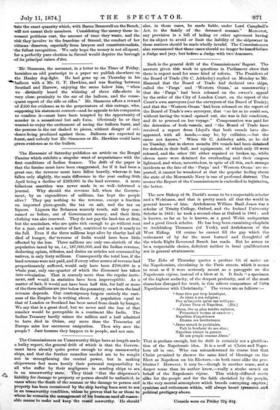The Economist of Saturday publishes.an article:on the Bengal :Famine which-exhibits
a singular 'want of acquaintance with the 'first conditions of Indian finance. The drift of the paper is that the famine must have been exaggerated, for if it had been a great one, the revenue must have fallen heavily, whereas it has fallen only slightly, the main difference in the -year ending 30th April being a decline of £369,000 in-the land revenue. A more -fallacious assertion was never made in =so well- informed a journal. Why should the revenue •fall, when -the Govern- ment, by an expenditure of millions, has kept the people alive ? 'They -pay nothing to the revenue, except a fraction on imported piece-goods, the tax on salt, and the tax on liquors. Liquors the Beharees scarcely touch, salt they con- sumed as`-before, out of Government money, and their little clothing was also renewed. They do not pay the land-tax at first, but the zemindars, who are quite rich enough to go without rent for a year, and as a matter of fact, contrived to exact it nearly to the full. Even if the three millions kept alive by charity had all died of hunger, the revenue of India would have been little -affected by the loss. Three millions are only-one-sixtieth of the population taxed by 1113, i.e., 187,000,000, and the Indian revenue, deducting opium, tributes, and duties on articles not consumed by natives, is only forty millions. Consequently the total loss, if the land revenuewere not paid, and if every other source of revenue had proportionately suffered, would only have been £700,000 in a whole year, only one-quarter of which the Economist has taken into (maculation. That is scarcely more than the regular incre- ment, and would in statistics have been imperceptible. As a matter of fact, it would not have been half this, for half or more of the three millions are just below the peasantry, on whom the land revenue depends. Our - contemporary forgets entirely the vast- ness of the Empire he is writing about. A population equal to that of London or Scotland has been saved from death by hunger. We say that is a great deed, but -we never said the loss of that number would be perceptible in a continent like India. The Indian Treasury hardly misses the million and a half admitted to have died in Orissa, any more than the Treasuries of Europe miss her enormous emigration. Then why save the people ? Just because they happen to be people, and not rats.


































 Previous page
Previous page